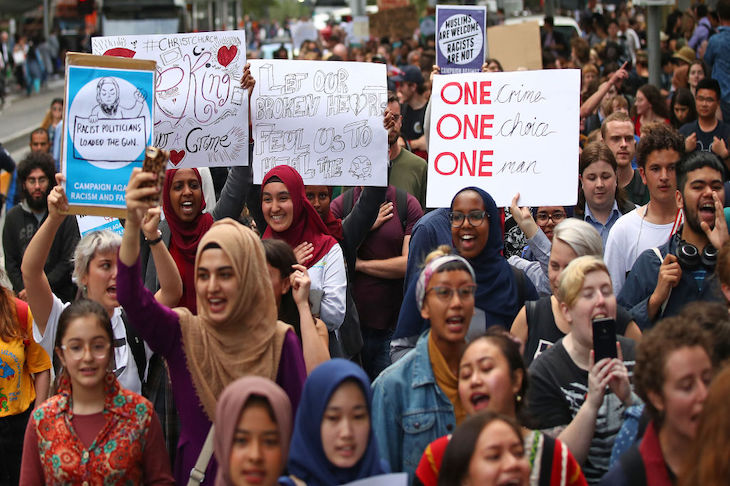It has suddenly become very difficult to have a conversation about terrorism that isn’t overtly politicised or faintly hysterical. This is because so much of the discussion is dominated by what the late American philosopher Robert Nozick scornfully described as ‘normative sociology’ – the ‘study of what the causes of problems ought to be’.
‘If X is bad’, Nozick wrote, ‘and Y, which also is bad, can be tied to X via a plausible story it is very hard to resist the conclusion that one causes the other.’ Because terrorism is obviously very bad indeed, it is acutely susceptible to being co-opted by cynical observers as a logical outcome of everything they love to hate.
In the aftermath of the Christchurch massacre, in which an Australian white nationalist murdered 50 people in two mosques in New Zealand, Nozick’s normative sociology left the ivory tower of academia and went mainstream. In the New York Times, the Canadian writer Omer Aziz suggested that the Christchurch outrage, just like a string of other far-right atrocities, was rooted in ‘a pathology of hatred’ that ‘has spread around the world’ and ‘put all our lives at risk’. According to Aziz, this pathology, which he names as Islamophobia, is not only ’embedded in much of Western society’, it is also validated by public intellectuals like Sam Harris, who he accuses of ‘preaching that Islamophobia is not the problem; Islam is’. Aziz writes:
‘If Islam is the problem, perhaps we should keep an eye on these Muslims. Send patrols into their neighbourhoods. Make them prove that they are not terrorists. Ban them, as President Trump wanted. Ideas are not harmless: They are taken seriously by thousands of people. If only one person applies these deranged ideas about the other to the real world, we get a mass-murder like the one we just witnessed.’
Aziz didn’t elaborate on how Harris’s critique of Islam necessitated or justified the slaughter of scores of innocent Muslims in their place of worship. But he was insistent that ‘Racism begins with ideas. It ends with violence.’
There are undoubtedly problems with Harris’s overly literalist approach to Islam, but it’s quite a stretch to tie it to the Christchurch massacre. Aside from minimising the perpetrator’s own moral responsibility, apportioning blame to Harris and other public intellectuals (Aziz also took Jordan Peterson to task for saying that Islamophobia is a ‘word created by fascists’) was an extraordinarily reductive reading of the atrocity. It was certainly over-predictive, in that millions of people have been exposed to Sam Harris’s work and not slaughtered scores of innocent Muslims. And even if we accept that the anti-Muslim rhetoric of Trump and other like-minded right-wing demagogues emboldened Tarrant, it is hard to see how that rhetoric justified or excused the live-streamed slaughter of Muslim worshippers. Aziz’s article says far more about the story-teller than about the causal antecedents of the Christchurch massacre.
Ironically, those who have sought to amplify the role of anti-Muslim rhetoric and discourse in Brenton Tarrant’s radicalisation are the very same people who, in the aftermath of every major Isis directed or inspired atrocity, insisted that extreme (religious) rhetoric and belief had little or nothing to do with the radicalisation of the perpetrators. The journalist and broadcaster Mehdi Hasan, for example, never gets bored of pointing out that ‘it isn’t the most pious or devout of Muslims who embrace terrorism, or join groups such as Isis’. ‘Religion,’ he insists, ‘plays little, if any, role in the radicalisation process.’ For Hasan, jihadist radicalisation is primarily driven by secular political grievances about the crimes and blunders of western foreign policy.
The right is also full of amateur sociologists, although you don’t tend to find them in the pages of the New York Times. Every time a jihadist attack occurs these people — Tommy Robinson comes instantly to mind — can’t wait to ride their favourite hobby-horse, which is trashing Islam. They do this by linking the mainstream of the religion to the murderous actions of its fringe members, insisting that the fringe is actually the ‘true face’ of the mainstream. Jihadist terrorism, they argue, is the logical culmination of ideas that are rooted in the classical texts of the religion. They also point to the corrosive influence of Islamist preachers, who stoke hatred and spread it around the globe.
Ironically, some of those who claim that there is a direct causal link between radical Islamic beliefs and jihadist violence are the very same people who are now accused of having blood on their hands for the Christchurch massacre. For example, Ayaan Hirsi Ali, a former Muslim who is now among Islam’s more prominent critics, has argued that the ’cause of [jihadist] terrorism’ lies in ‘the ideology of radical Islam.’ Sam Harris has similarly asserted that the 9/11 terrorists were directly motivated by Islamist beliefs. ‘Believe,’ Harris wrote, ‘that you are a member of a chosen people, awash in the salacious exports of an evil culture that is turning your children away from God, believe that you will be rewarded with an eternity of unimaginable delights by dealing death to these infidels – and flying a plane into a building is only a matter of being asked to do it.’
Normative sociology, which is fixated on calling out perceived miscreants and deviants, should itself be called out. Far from being a serious attempt to figure out what is going on, it is a form of rank demonology that confuses and misleads people about the complex realities of social and political life. Terrorism is far too important an issue to be left to the amateur practitioners of this shadiest of disciplinary sub-specialisms.
Simon Cottee is a senior lecturer in criminology at the University of Kent and a contributing writer for the Atlantic.






Comments